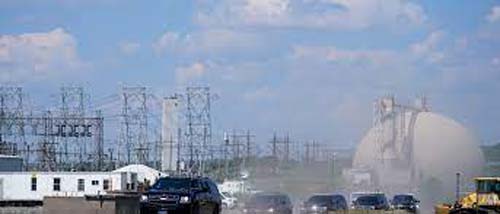
Partisan divides impede US response to climate change
Kerry Boyd Anderson
US President Joe Biden promised major progress toward addressing climate change, including significant cuts in US emissions. More than a year into his presidency, his climate agenda has hit obstacles in Congress and from the Supreme Court. Meanwhile, Americans increasingly are feeling the real-life impacts of climate change, including record high temperatures, extreme drought and wildfires this summer.
On Wednesday, Biden announced new steps that he can take as president to address climate change. His plan includes increased funding to prepare for climate change impacts and new offshore wind projects. The White House is reportedly considering declaring a “climate emergency,” which would give the president more — though still limited — powers to take action. Meanwhile, Biden is continuing to pursue a deal in Congress, which is essential to implementing larger and more permanent policies.
Another challenge for Biden is that the American public is split in their views of how to address climate change and whether the current president is doing the right thing on the issue. A survey from the Pew Research Center released earlier this month found that 49 percent of US adults believe that Biden’s climate policies are taking the country in the right direction, compared to 47 percent who say the wrong direction.

Partisanship deeply influences Americans’ views on climate change. The Pew survey found that 82 percent of Republicans and those who “lean Republican” say that Biden’s climate policies go in the wrong direction, while 79 percent of Democrats and those who “lean Democrat” say the president’s policies go in the right direction.
However, even among Democrats who support Biden’s policies, 61 percent say that he could be doing a lot more. In reality, the president is in a bind: His powers to address climate change are limited, and a recent Supreme Court ruling further reduced the executive branch’s authority. With the US Senate divided between Republicans and Democrats and expected Republican victories in the November elections, Biden has limited leverage in negotiations while also facing a time crunch. Many Democrats are very frustrated with the lack of major progress on such an urgent issue, but large-scale changes are very unlikely when public opinion and Congress are so divided.
The Pew poll suggests that there are areas of some bipartisan agreement. Large majorities of Republicans and Democrats support “planting about a trillion trees to absorb carbon emissions” and “providing a tax credit to businesses for developing carbon capture/storage.” Beyond these steps, the poll found large partisan gaps, although almost half of Republicans support “requiring power companies to use more energy from renewable sources,” which has support from 90 percent of Democrats.
In reality, the US president is in a bind: His powers to address climate change are limited, and a recent Supreme Court ruling further reduced the executive branch’s authority
The partisan divides are hardly surprising, even though a large majority of Americans say that they are experiencing increasingly extreme weather, and such weather does not discriminate between Republicans and Democrats. There are deep historical, cultural and ideological differences that guide Americans’ differing views on climate change. The political parties’ narratives on the issue reflect those.
Today, Democrats want an “all of the above” approach to climate change, which they see as a critical priority demanding urgent action. They want to cut fossil fuel emissions while also increasing the ability to respond to climate change impacts, with a particular focus on helping the most vulnerable Americans. Democrats also argue that shifting the economy away from reliance on fossil fuels will have positive economic effects, spurring innovation, upgrading infrastructure, creating new green economy jobs and reducing the economic devastation that climate change can wreak. They recognize that an energy transition will have costs but believe that the long-term benefits strongly outweigh those costs.
Republicans spent years denying that human-caused climate change was happening. Today, their narrative has shifted to greater acceptance that climate change is occurring and, to some extent, increased willingness to acknowledge the role of fossil fuels. However, Republicans emphasize the costs of reducing emissions, highlighting the potential for job losses, inflation and overall damage to the economy of shifting away from fossil fuels. They tend to emphasize American energy independence, often calling for more, not less, oil and gas production. Republicans’ approach to climate change emphasizes building resiliency, such as measures to protect communities from extreme heat, sea level rise, flooding and more.
Partisan differences are the defining feature of the US debate on climate change, playing a greater role than regional or demographic differences. However, the Pew poll and other surveys suggest some more shared understanding among younger Americans. Younger Democrats are more likely to see climate change as a pressing priority than older Democrats, and much of the outrage over the lack of progress comes from the younger generation. Young Republicans are still much less likely to support measures to address climate change than their Democratic counterparts, but younger Republicans are also more likely to support policies such as incentives to switch to electric vehicles and requiring power companies to use more renewable energy sources than older Republicans.
It can be tempting, therefore, to say that hope for the US seriously addressing climate change rests with young people. However, the younger generations are years away from obtaining the type of power that would allow them to implement significant policies. By then, the window to mitigate climate change might have disappeared. Older Americans need to find bipartisan solutions now.
The writer is a political risk consultant with more than 18 years of experience as a professional analyst of international security issues and Middle East political and business risk
